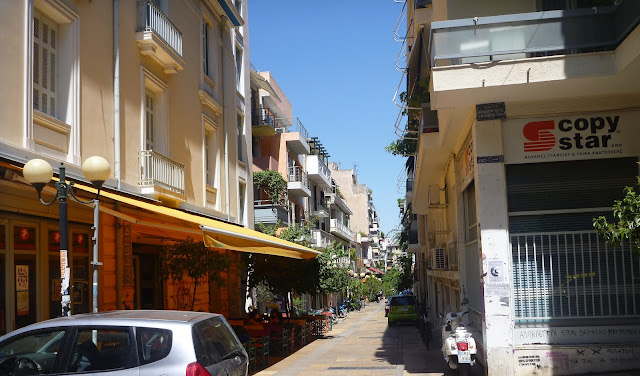So, how close is this portrayal to reality? It is true that an awful lot of students live here as it is very close to the University and the Polytechnic and a large majority of them are anti-establishment and very radicalised - just looking at the posters around the area is testimony to that. A lot of the resistance that Athens has witnessed in the last years has started in this area. It is here that the school boy Alexis Gregoropoulos was murdered by the police last year, and this sparked off large demonstrations in the streets of Athens.
There are a lot of wrecked, dilapidated buildings like this one
and an awful lot of graffitti, everywhere.
But, there are also an awful lot of quiet, residential streets like this one, and the abundant cafeterias and tavernas have tables outside which are always buzzing with life
You don't find many residential streets like this in Athens anymore. Athens is full of apartment blocks and what these spell out is the end of community life
There is a real sense of community here, of people using the area and living in it - a real medley of people, grungy youth, trendies, old ladies wearing twin sets and pearls carrying their shopping, older men, newspaper under the arm, walking to their favourite cafeteria for a coffee and a read.
Community life is apparent everywhere
Navarino Park is testimony to the community spirit that characterises the area. This used to be a vacant lot that the local council wanted to turn into a car park. The local residents, not the political activists even though I am sure they contributed, occupied the space two years ago announcing that the area needed a park - every weekend they would be there, digging, planting and this is the result. The press screamed their disapproval but the residents got what they wanted and needed.
This poster is advertising a free screening of the film 'Punishment Park' in the 'self-governing park of Navarino' on 24 July.
There was another poster advertising a free screening of the film 'The Artist' in Exarheia Square.
The shops are also interesting. There are lots of cafeterias and tavernas as well as small grocery stores. The rest are publishing houses
bookshops
book binders
printers
graphic design. Basically everything to do with books and reading.
and record shops.
There are posters everywhere:
Solidarity with Syria: this poster is advertising yet another free screening of a film on the Syrian situation to be shown in the Square
Reclaim the streets: a poster about rape
against fascism
against fascists 'because they make the air we breathe stink'
We want:
Albanian fellow pupils
Afghan colleagues
Pakistani neighbours
and
Out with the fascists
We found this delightful taverna in a pedestrianised side street. The food was traditional Greek, delicious and very cheap: we had a salad, two main courses and two glasses of wine and paid 18 euros. We had lunch early and were the only people eating but the three delivery motorbikes were constantly busy and every two minutes another local would come and pick up a take away. I bet it is packed at night.
And what I want to know is this: how do the residents cope with all the tear gas?



















"a hotbed of anarchist radicalism, an area where the very fabric of society is threatened every minute of the day "
ReplyDeletedoesn't sound like such a bad place to me!
ha! ha! ha! very good!
ReplyDeleteOn a slightly different matter Mick, a while ago you asked me if I could recommend any reading on the Greek junta. I have not been able to come up with anything that has been translated in English yet, but I thought you might find this article interesting: http://www.lrb.co.uk/v34/n13/richard-clogg/in-athens
Thanks Eirene. I'll follow up on your suggestion
ReplyDelete